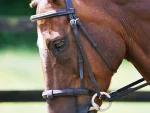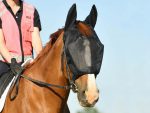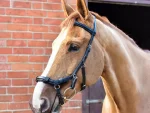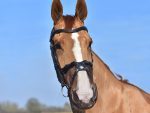Subtotal £29.99
Equine Behaviour
Horse Care & Equipment
Real Stories
1 year product guarantee
Free delivery on most orders over £40
Rated 4.9/5 stars on Feefo

Researched & tested products

Innovating for over 20 years!
Supporting Redwings Horse Sanctuary & Brooke
Feefo Gold Trusted Service Award Winner
Get more time to pay with Klarna
Nose nets and other facial coverings have played a large part in returning many head shakers to normal function. They remain the most successful, preventative, home treatment for headshaking.
A recent trial showed the use of nose nets halved the severity of headshaking symptoms in 50% of the horses studied with some improvement in symptoms seen in up to 80% of sufferers.
In addition, our research has shown that nose nets do not appear to work by actively filtering out pollen particles and stop them from being inhaled – the holes are just too big! Instead, it is thought that they may work by distorting the airflow to the nose and their presence may distract or comfort the horse.
British Dressage and British Eventing have now accepted the use of nose nets in competition. Face and ear nets can also be effective in alleviating headshaking which may suggest that for some horses there is a different cause or that these nets also have a distracting or protective role.
Creating a good relationship with your vet and trusting their judgement is an essential start to managing headshaking. Drugs are available such as commonly used cyproheptadine and carbamazepine. Surgical techniques can be used to cut faulty nerves that are thought to cause headshaking. The success of these methods is variable but is increasing as we learn more about the condition.
Keeping a diary of headshaking attacks may help you to identify potential triggers or times when the headshaking is worse. As a rule, preventing an attack is better than attempting to ride the horse through one. Remember, most head shakers are suffering from an underlying clinical problem that causes the headshaking. Some owners report improvements when their horses are stabled during the day and turned out at night in the summer. In addition, wetting hay reduces the possibility of any respiratory complications. A recent report concluded that acupuncture is unlikely to be of benefit in the majority of cases.
With careful management, the outlook for many head shakers is bright and a happy and rewarding relationship can still be maintained. Although it seems that in terms of potential causes we’re doing more ruling out than ruling in research is progressing and the future is promising.

Reduce headshaking* with the Net Relief Nose Net for horses…

Stress-free summer hacking with this ride on fly mask which…

Reduce headshaking* with this Net Relief Nose Net for Anatomical…

Reduce the shaking* with this Net Relief Nose Net for…